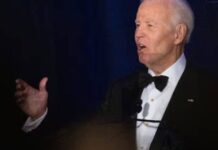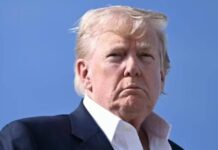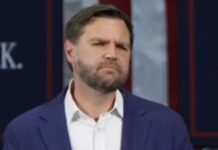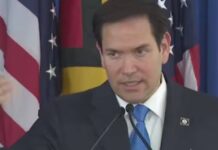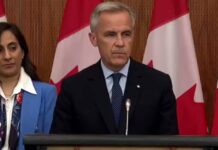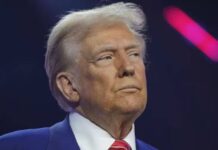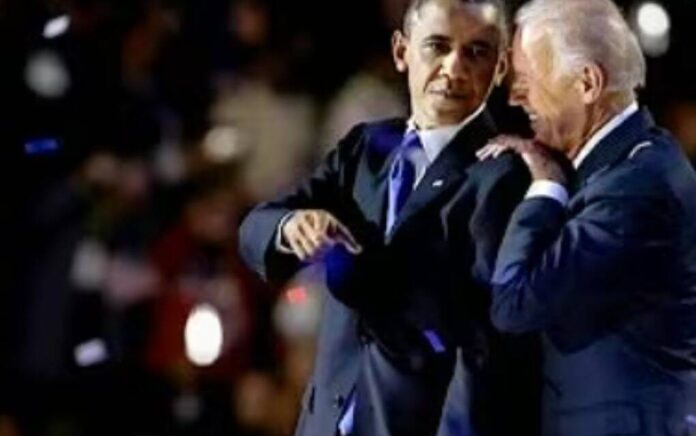
Former President wanted no one to find this. But the truth is coming out.
Because Biden’s now been implicated in Obama’s treasonous scheme to attack Trump.
Biden’s Role in 2016 Trump-Russia Narrative Raises Questions
In the summer of 2016, then-Vice President Joe Biden emerged as a key figure in a contentious effort to tie Republican presidential nominee Donald Trump to Russian President Vladimir Putin. This move came shortly after U.S. intelligence reportedly intercepted communications suggesting that Hillary Clinton’s campaign was orchestrating a strategy to discredit Trump by falsely associating him with Russian interference. Biden’s actions, which aligned closely with the timing of these intercepts, raise questions about the motives behind his public attacks and the historical context in which they unfolded.
According to intelligence officials cited by Just the News, the timing of Biden’s accusations against Trump in July 2016 was notable because it coincided with predictions outlined in intercepted Russian communications. These intercepts allegedly revealed that Russian spy agencies had accessed details of the Clinton campaign’s strategy, which included plans to vilify Trump. Biden’s vocal role in this narrative, particularly as the Democratic National Convention (DNC) kicked off to nominate Clinton, suggests a coordinated effort to amplify these claims at a critical juncture in the presidential race.
Biden’s attacks on Trump began in earnest during the DNC in late July 2016, just as the Clinton campaign reportedly approved a plan to link Trump to Putin. This timing fuels skepticism about whether Biden’s actions were driven by genuine national security concerns or by political opportunism. A source familiar with the intelligence, speaking anonymously to Just the News, noted that the U.S. has tools to verify the authenticity of such intercepts, though these methods remain highly classified.
Declassified portions of Special Counsel John Durham’s 2023 report provide further insight into these allegations. The report’s appendix, now largely unredacted, details a purported Clinton campaign plan to distract from Clinton’s email controversy by falsely tying Trump to Russian interference. This revelation casts a shadow over Biden’s role, as he became the public face of this effort shortly after the plan’s alleged approval. The Durham report’s findings suggest that Biden’s rhetoric may have been part of a calculated strategy rather than a spontaneous response to intelligence concerns.
The intelligence in question included intercepted communications from an ally of George Soros, suggesting that the Clinton campaign was plotting a sustained effort to “demonize” Trump by connecting him to Putin. Some within the CIA, according to the Just the News source, believed these intercepts were credible, possibly compiled from multiple pieces of evidence gathered by Russian intelligence. The fact that events, including Biden’s public statements, unfolded as predicted in these intercepts lent weight to this assessment, though it also raises concerns about the manipulation of intelligence for political ends.
Durham’s report confirms that the Intelligence Community received this “Clinton Plan” intelligence in late July 2016. The report also notes that some FBI analysts viewed the intercepted communications as authentic, while others were skeptical. A 2017 CIA assessment, cited in the declassified appendix, concluded that the communications were not Russian fabrications but likely composites of hacked U.S. emails, including those from Soros’s Open Society Foundations and other think tanks. This ambiguity complicates the narrative and highlights the challenges of distinguishing fact from disinformation in a politically charged environment.
Then-CIA Director John Brennan’s handwritten notes, as revealed by Durham, indicate that he briefed Biden, President Barack Obama, FBI Director James Comey, and others in early August 2016 about Clinton’s alleged approval of a plan to stir up a scandal linking Trump to Russian interference. The proximity of this briefing to Biden’s public statements at the DNC suggests that he was acting on specific intelligence, though the motives behind his involvement remain open to scrutiny. Was Biden genuinely alarmed by the intelligence, or was he advancing a political agenda?
Text messages between Clinton campaign officials, referenced in Durham’s appendix, point to efforts to involve Biden’s vice presidential office in raising concerns about Russian hacking and Trump’s alleged ties. These communications add to the perception that Biden’s role was not incidental but part of a deliberate strategy. His swift engagement in the narrative, including high-profile media appearances, reinforces the idea that he was a willing participant in the campaign’s efforts to shape public opinion.
On July 26, 2016, Biden appeared on ABC News with George Stephanopoulos at the DNC, asserting that Putin preferred Trump over Clinton. “I’ve traveled over a million miles around the world just in the last seven and a half years. But I haven’t found a single world leader, ally, friend, who says, ‘Geez, it’s great. Maybe we’ll get a Trump presidency.’ Oh, I think Putin doesn’t want a united NATO,” Biden said. His claim that Putin opposed a united NATO and EU, while plausible, was framed to cast Trump as a threat to global stability, a narrative that conveniently aligned with the Clinton campaign’s goals.
The following day, Biden joined MSNBC’s Morning Joe in a Philadelphia bar near the DNC, where he continued to link Trump to Putin’s interests. “This whole thing about NATO, now, you know, everybody’s making a big thing and saying, ‘He [Trump] is a friend of Putin’s.’ I don’t buy that, but here’s what he’s doing: He’s playing directly into the hands of a guy who says — your father [Zbigniew Brzezinski] would tell you — his overarching goal of Putin is to break up NATO and to fracture Europe,” Biden said. His comments, while stopping short of directly accusing Trump of collusion, were carefully worded to imply a dangerous alignment.
Biden’s prime-time DNC speech on July 27, 2016, escalated the rhetoric, as he declared, “We cannot elect a man, who belittles our closest allies, while embracing dictators like Vladimir Putin.” This direct attack framed Trump as a national security risk, a theme Biden would revisit in subsequent appearances. The intensity of his rhetoric, delivered at a high-stakes moment, suggests a calculated effort to sway voters by leveraging fears of foreign interference.
The Obama administration’s response to questions about Biden’s characterization of Putin as a dictator further muddies the waters. On July 28, 2016, White House Press Secretary Josh Earnest avoided directly endorsing Biden’s label, pointing instead to a State Department report describing Russia’s authoritarian system under Putin. Earnest’s evasion when pressed on whether Obama shared Biden’s view highlights the administration’s cautious approach, perhaps aware of the political risks of amplifying unverified intelligence.
President Obama himself joined the effort during his DNC speech on July 28, 2016, accusing Trump of “cozying up to Putin” and questioning his commitment to NATO allies. Clinton, in her DNC speech the following day, avoided directly linking Trump to Putin but emphasized her support for NATO against Russian threats. This division of labor—Biden and Obama taking the lead on the Trump-Putin narrative while Clinton focused on themes—suggests a coordinated strategy to maximize the impact of the allegations.
Biden’s campaign trail rhetoric continued to escalate. In mid-August 2016, during his first joint appearance with Clinton in Scranton, Pennsylvania, he claimed Trump “would have loved Stalin” and accused him of inviting Russian cyberattacks against the U.S. These hyperbolic statements, reported by The Guardian, reflect Biden’s willingness to push the narrative to its limits, even at the risk of inflaming tensions. His trip to Latvia later that month to reassure Baltic states of U.S. support for NATO further amplified the Trump-Putin narrative, as reported by Reuters.
The Clinton campaign’s efforts culminated in a Halloween 2016 tweet claiming that “computer scientists have apparently uncovered a covert server linking the Trump Organization to a Russian-based bank.” A statement from campaign adviser Jake Sullivan, who later became Biden’s national security adviser, described this alleged connection as a “secret hotline” that could explain Trump’s “bizarre adoration” of Putin.
The Durham report’s revelations, including Clinton’s dismissal of the intelligence as “Russian disinformation” and denials from Soros’s Open Society Foundations, complicate the narrative. While the intercepts provided valuable insights into Russian hacking efforts, their authenticity remains debated. The report’s findings suggest that the Clinton campaign’s strategy, with Biden as a prominent figure, may have exploited unverified intelligence to advance a political agenda, leaving a lasting but misleading impression of Trump’s ties to Russia.


